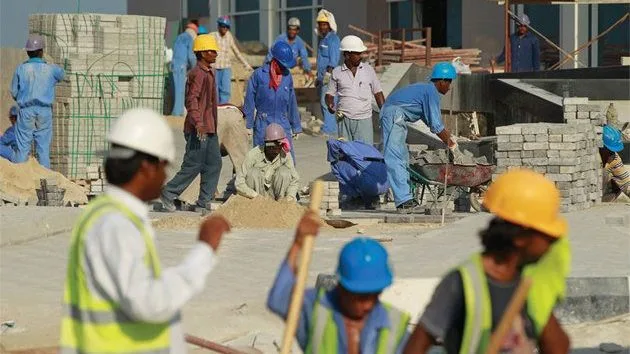A new report by the Trade Union Congress (TUC) has shed light on widespread abuse of migrant workers in Qatar as the World Cup gets underway.
“Legacy of the kafala system lives on”
Testimonies from migrant workers reveal that the “legacy of the kafala system lives on”, despite Qatar passing a host of legislative reforms in 2020 to abolish the notorious sponsorship system that ties migrant workers to their employers, enabling exploitation and forced labor.
Speaking to migrant workers on the eve of the World Cup last week, the TUC’s report found that workers are subjected to illegal recruitment fees and wage theft leaving them saddled with debts. Unscrupulous employers were found to be purposefully looking for loopholes in legislation to more easily exploit workers.
Ram, a construction worker, told the TUC:
“They failed to pay my full salary for three months. It was 2500 rials a month but they paid me only 1500. They said take it or leave it. They did not pay us for overtime either. […] Then the company issued a list of workers to be sent home. We didn’t want to return because we had loans to pay back at home. […] We asked them to pay our remaining salary, but they told us we would not get anything. We worked hard for them, constructed buildings and hotels for them, but they didn’t pay for it. […] The World Cup does not benefit us at all. The benefits go to the government, not to us. We worked hard in their country and now we are unemployed.”
Ram’s account is reflected in the experiences of many other workers who have toiled in harsh conditions to make the World Cup in Qatar a reality.
Changes on paper
Qatar has pointed to its cooperation with the International Labour Organization since 2018 and reforms it made in 2020 as proof of its commitment to better protect migrant workers from exploitation. However, evidence continues to point to the fact that little has changed for workers on the ground.
Despite this, the Qatari Minister of Labour has refused to support a migrant worker support fund dismissing calls from Freedom United and human rights campaigners demanding FIFA pay up to compensate exploited migrant workers as a mere “publicity stunt”.
Qatar must go further
The TUC’s report makes clear that though certain changes have been made on paper – ability to change employers, introduction of a minimum wage, wage protection system to prevent wage theft – the system is yet to be implemented to the extent required to ensure the majority of migrant workers are protected.
The reality is that significant barriers remain for migrant workers to leave exploitative work. Some workers are unaware of the recent reforms while others are unsure of their rights under Qatari law. While mechanisms exist for workers to report disputes, this can be very time consuming, and can result in retaliation against workers. Workers continue to report being threatened with deportation from employers if they want to leave their job with little being done to hold employers accountable.
Sign the petition calling on Qatar to effectively implement reforms to protect migrant workers from exploitation.







Freedom United is interested in hearing from our community and welcomes relevant, informed comments, advice, and insights that advance the conversation around our campaigns and advocacy. We value inclusivity and respect within our community. To be approved, your comments should be civil.
I sponsored a child from the Philippines for many years and later kept in touch. She is currently working in Qatar. Although her contract specifies that she works 8 hours a day and has one day off per week, she is expected to work 7 days a week from 7.30 am in the morning till 11 or 12 at night with only a couple of hours off during the day and no extra pay.